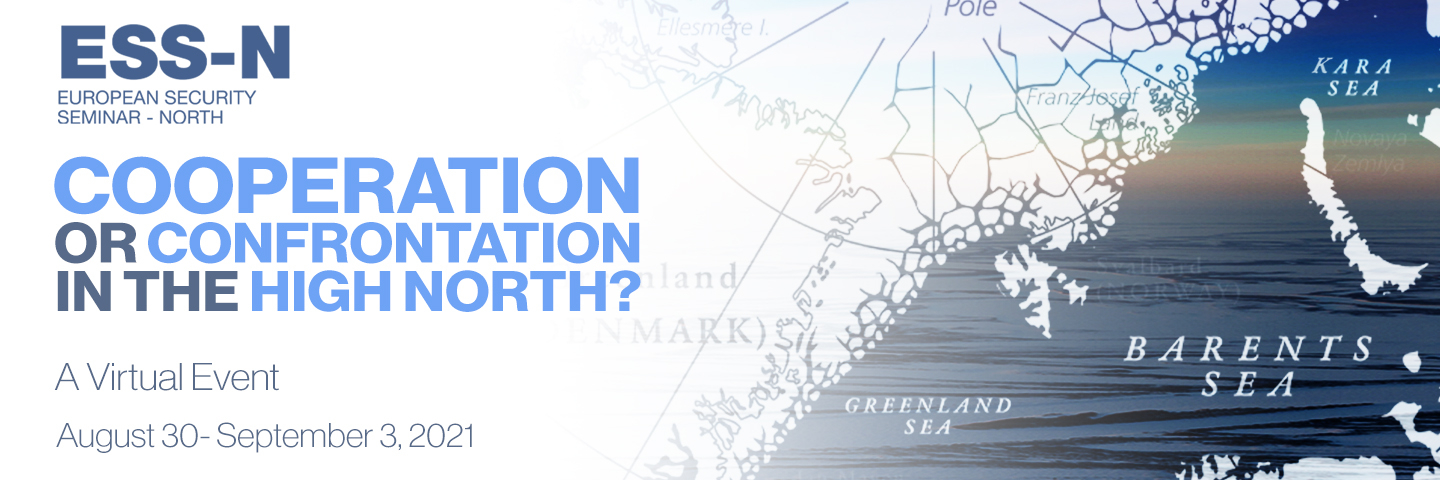
Marshall Center Hosts Virtual European Security Seminar-North focusing on Cooperation or Confrontation in the European High North
By College of International and Security Studies
George C. Marshall European Center for Security Studies
GARMISCH-PARTENKIRCHEN, Germany (Sept. 9, 2021) – The George C. Marshall European Center for Security Studies hosted a virtual European Security Seminar-North: “Cooperation or Confrontation?” from Aug. 30 to Sept. 3. There were nearly 40 participants representing 13 nations – including all eight Arctic States – attending the weeklong seminar focused on the security challenges and opportunities in the European High North.
Marshall Center Director, retired U.S. Air Force Maj. Gen. Barre Seguin, provided welcoming remarks in which he stated, “The European High North is at the forefront of Arctic trends. With the greatest Arctic population, economic development, and militarization, we’re seeing Western and Russian strategic interests increasingly collide. The impacts of intersecting climate, economic, environmental, and security trends will be felt most dramatically in this sub-region of the Arctic.”
He added, “the European High North is more than just great power competitors – Arctic states like Norway, Sweden, Finland, Iceland, and Denmark have long made important contributions to regional security and stability. Although the region has long been known for cooperation, collaboration, and good governance, the old adage ‘High North, Low Tension’ is likely behind us.”
Seguin’s remarks highlighted the U.S. and German commitment to better understand this complex region and the value of bringing together distinguished speakers and regional security practitioners, scholars, analysts, and diplomats to discuss these important challenges.
Throughout the week, ESS-N panels brought together notable experts to discuss key security trends in the European High North and perspectives from the Arctic and Baltic states on regional security. The discussions enhanced participants’ knowledge of topics such as geostrategic competition in the European High North, with an emphasis on the emerging security dilemma on NATO’s Northern Flank.
The seminar developed a broader understanding of regional perspectives on the European High North and Baltic region. A keynote address by Anna Wieslander, director for Northern Europe at the Atlantic Council, highlighted strategic interests and military activities in the region.
In the opening panel, Dr. Alexander Sergunin, St. Petersburg State University, and Dr. Elizabeth Buchanan, Australian War College, provided a dynamic analysis of Russia’s Chairmanship in the Arctic Council and implications for regional stability.
The relevance of the Arctic for the U.S. security strategy was analyzed throughout the seminar with Dr. David Auerswald and Troy Bouffard presenting assessments on U.S. strategic interests in the European High North.
Participants also gained a deeper understanding of the evolving perspectives of Nordic and Baltic states through speakers Dr. Alexandra Middleton, Oulu University, Finland; Tonis Idarand, International Centre for Defense and Security, Estonia; and Nicklas Granholm, Swedish Defense Research Agency.
In a keynote on Thursday, retired Navy Adm. James Foggo, former Commander of U.S. Naval Forces Europe – Africa and Allied Joint Force Command Naples, as well as a distinguished fellow at the Center for European Policy Analysis, emphasized the importance of developing a Trans-Polar Bridge to improve regional cooperation.
Retired Rear Adm. Lars Saunes, former Chief of the Royal Norwegian Navy and director of the Newport Arctic Scholars Initiative at the U.S. Naval War College, and Dr. Pavel Baev, Peace Research Institute Oslo, debated the future of security and stability in the European High North.
Friday concluded with closing remarks by ESS-N Course Director, Cmdr. Rachael Gosnell, and Deputy Course Director, Dr. Katrin Bastian, in which they summarized the findings of the week and thanked the participants and their Marshall Center colleagues, especially the Academic Advisors Professor James Wither and Dr. Matthew Rhodes, who oversee all area studies programs at the Marshall Center.
The seminar provided participants an opportunity to examine the complex European High North and the prospects for High North stability and cooperation. The program offered a unique dialogue on important security issues that enabled participants to be better prepared to manage future security challenges in the European High North.
The week was filled with fruitful discussions as well as brilliant exchanges of thoughts that yielded recommendations for policymakers on innovative approaches to reducing regional tensions. Part of the ESS-N series, the program demonstrated the value of the Marshall Center in hosting unique security discussions on the evolving region.
